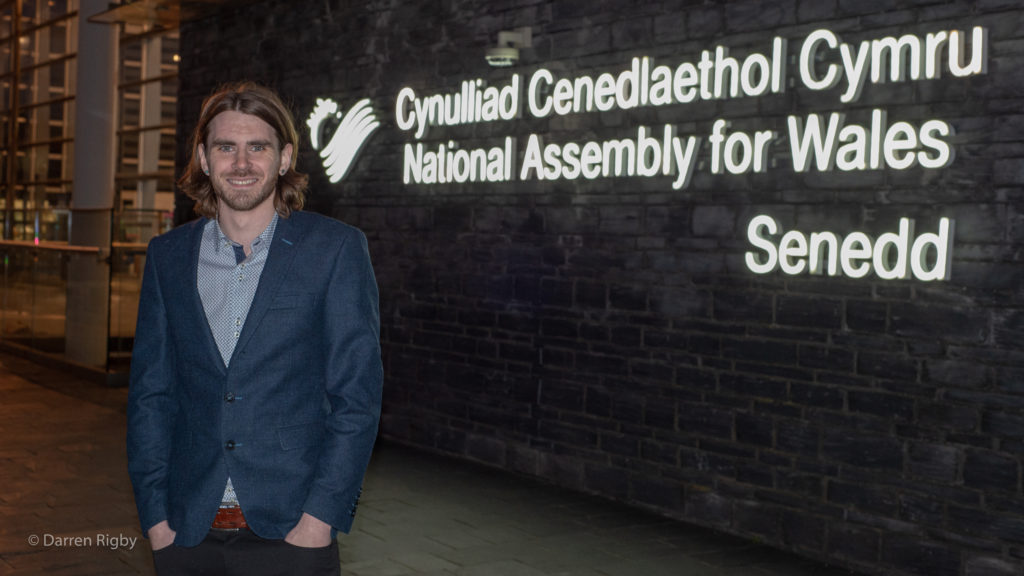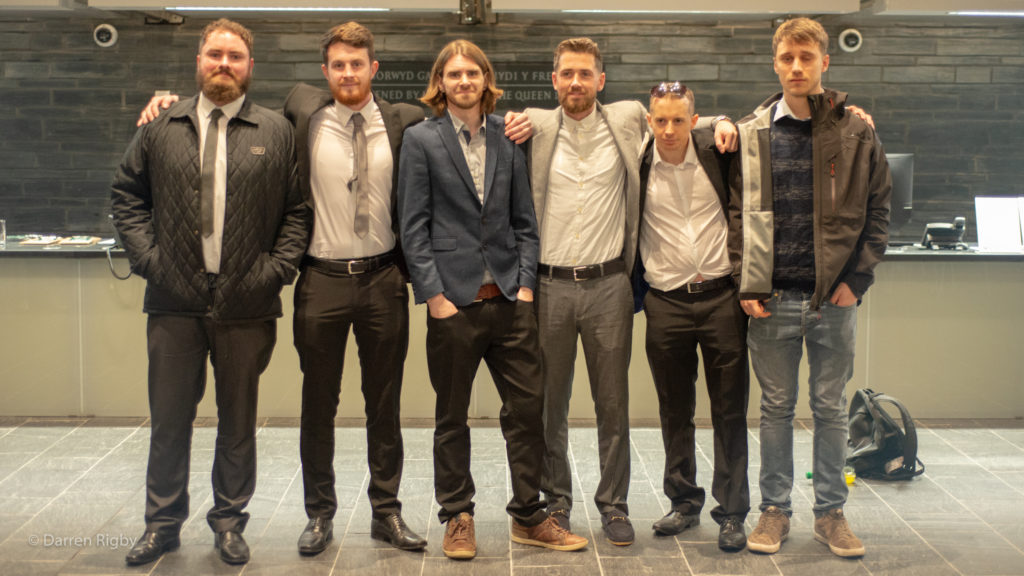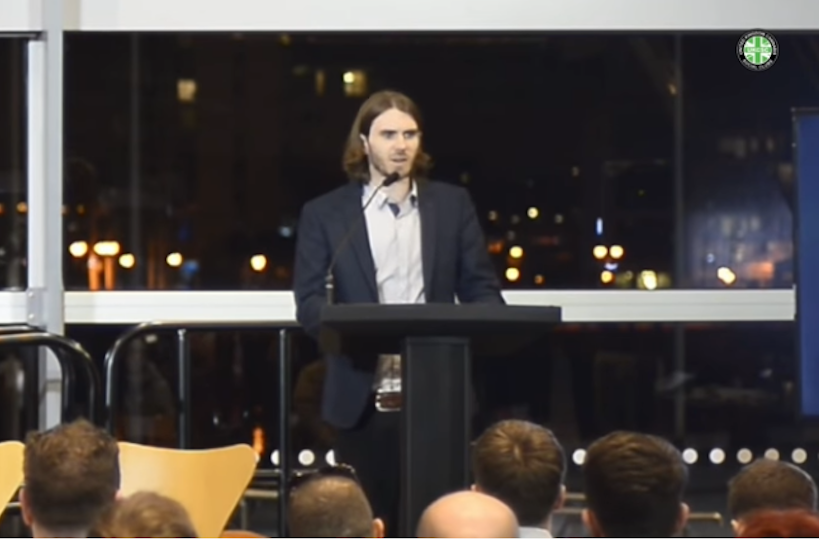UKCSC chairman Greg de Hoedt told the Welsh National Assembly that Wales should legalise cannabis clubs to create jobs and lift public health and safety in his speech to the Cannabis Wales Industry summit on 8 January.
Greg started by explaining how the UK health service had failed him when he was diagnosed with Crohn’s, meaning he had to travel to the US to get the help he needed.
“Fortunately I had friends who were running dispensaries and growing their own medical cannabis in the US, in states like California, Colorado, Oregon, Washington, and they invited me out there. They said, ‘Get the hell out of the UK, we can get you access to cannabis oils and the strains you need, we’ve got people with Crohn’s you can speak to, it doesn’t sound like you’re getting the help you need there in the UK’.
“In Colorado I was given access to cannabis oil straight away. Within two weeks I’d gone from using a walking stick to climbing up the Rocky Mountains. It was life changing. If it was this easy to get my health back having been told I was going to die, there had to be hope for other people who hadn’t had this opportunity.”
You don’t need to be a cannabis consumer to support a case for change. The UKCSC isntotally dependant on fundraising to help deliver what patients and communities need. Sign up today and help them out!https://t.co/Bkt7gG15Le pic.twitter.com/uUAa1dtx3Y
— Cannabis Industry Wales (@cannabis_wales) 9 January 2019
After six months Greg returned with the motivation to build something in the UK. “I got back and put the word out, I had a Youtube channel with a million views, trying to connect with people with the same views or in the same situation, with the same ambition as me, to make something better for the UK.
“So we set up the UK Cannabis Social Clubs in 2011. This country is 24 years behind California. People have seen what’s going on in the US, and in Spain where there’s 1,000 cannabis clubs. Consumers want that kind of equality. It’s really not nice being in your 20s and 30s and you’ve loved cannabis for the last 10 years, and you’re seeing it legalised all over the world, and people the same age as you are getting jobs, growing cannabis, being paid for it, not being arrested for it and leading a normal life; you want that for yourself and your friends as well.”
Greg explained the “split”of opinion with regards to the way Canada has rolled out legalisation, because its “over-commercialisation” has been less preferable to the previous “grey area system” that actually gave patients and consumers more rights. “So people are seeing that and they want to do something about it to make sure that the cannabis industry that is coming is the one they want.”
Greg also said that with the recent stories in the media about how cannabis has helped children with epilepsy, forcing the government to recognise the plant’s therapeutic value, “people in the UK realise they’ve been lied to”, meaning that even “non-consumers are behind this change”.

Turning to Wales and its links with cannabis, Greg said: “Howard Marks is obviously a huge Welsh icon. He’s taken the story of hash and smuggling cannabis around the world, he’s written books and had films made about him. He’s influenced people to learn about it, and they’ve learned about the injustices as well. Having a Welsh icon I think helps make Welsh people feel that cannabis is part of Wales.
“The Global Cannabis March in Cardiff is a huge affair every year. Everyone who is a cannabis enthusiast gets together and marches from Cathays Park down to the Bay, we stop off in town, give talks and interact with people on the way. People are a bit surprised to see so many people marching and waving flags in support of cannabis but it raises awareness and gets our voices heard. Howard Marks was the guest of honour in 2012.
“The Global Cannabis March happens in over 100 cities around the world, millions of people on the first Saturday of May every year. It’s on the 4th of May this year if everyone here can join us at Cathays Park around midday.
“Of course, Paul Flynn led on the Medical Cannabis Bill, he’s an MP from Newport. So you have a Welsh MP pushing this forward and leading the campaign.
“Wales is also the first country in the UK to prescribe Sativex to MS patients. The rest of the country is being denied. A Freedom of Information request from I think 2011 showed that only 1,420 patients in the whole of the UK were prescribed Sativex. Patients are being left in pain basically because of underfunding. The whole reason Sativex was given a licence was because MS patients were being busted [by police], and they’re still being busted. We’ve got patients contacting us asking what they should do because police have just raided them and taken their plants, their medicine. In Newcastle one patient was recently raided by armed police. This week an armed officer shot a man dead in a cannabis raid [in Coventry]. This is proof that prohibition kills. This isn’t the cannabis that is being dangerous, this is the policy that is doing it.”

Greg then explained how the UKCSC works and the benefits it offers to individuals and society as a whole.
“We are private social clubs for people over the age of 18. So you have to prove you’re an adult. The clubs ask you to come with a member who can vouch for you. We are of course in a situation where there are undercover police around, I’m sure there’s one here today… so hello…! It’s just a way to keep the community safe. The clubs are there for the members. The government has turned a blind eye to their needs, but we don’t want them on the streets. We give people a way to move away from the black market and give them more control over their cannabis interactions.
“There’s an annual fee to join the club. Members are given the opportunity and told how they can grow their own cannabis. There are over 70 clubs and communities working with the UKCSC and there’s over 160 cannabis clubs operating in the UK overall.
“Most people don’t know that lot of cannabis in the UK is grown by organised crime. They lock small children up in domestic houses, feed them pot noodles, don’t let them see sunshine, take away their passports. Eventually the police might raid the premises and arrest the child and lock them up. All the while the gang is getting away with £30,000 a crop. A crop is three months so you can see you can make over £100,000 a year from one premise; they likely have three to five running at a time. That’s easy big money to get from a crime for something that people should be able to grow themselves, and if they could grow themselves, they wouldn’t have to rely on organised crime to get.
“The average age of our members is actually 42. The oldest member is 89. We’ve got good characters who pop into the club from Teeside to London, here in Wales and down in Brighton where I’m a member. It’s really nice hearing their stories of different little cannabis projects that have popped up in the past, of clubs or coffee shops, to hear their experiences in the UK. You get a good idea of the shoulders we’re standing on.
“A cannabis social club is a good place for disabled people to come as well. At the moment a disabled person is given a bag of medicine from a doctor and told to go home and take these pills. That’s not really a nice existence. Cannabis social clubs offer people a chance to get out of their home, to be social. One patient said to me the other day, ‘Thank you so much for making me feel normal for the day.’ If coming to one of our clubs is what makes him feel normal, then that’s got to make it worthwhile. He doesn’t want to go to a pub and drink, he wants to come to the club.
“Cannabis is 114 times safer than alcohol. So if we’re giving people an option to move away from something that is dangerous for them, alcohol is a public health problem in the UK, then it’s got to be a good thing. If we give people a licenced product, or a product that has at least been tested, it’s gone through a screening protest, that’s helpful for everyone.
“Cannabis social clubs offer people a chance to get out of their home, to be social. One patient said to me the other day, ‘Thank you so much for making me feel normal for the day.’ If coming to one of our clubs is what makes him feel normal, then that’s got to make it worthwhile.”
“People who have been caught up in problematic drug circles, if they’re easily influenced if someone offers them cocaine or heroin, and they don’t care they just want to get the buzz, they’re likely to go and do that if they’re in an environment where those drugs are around. We don’t have those drugs at the cannabis social clubs, we separate those drugs from the drug market.
“There are five cannabis social clubs in Wales at the moment. We’ve got them in Swansea, Cardiff, Newport and Wrexham. We’re working with the Police Crime Commissioner in North Wales, Arfon Jones has been very supportive. It’s nice to have an elected official actually speaking up for cannabis consumers, because we all go to our MPs, we ask for their support and they don’t give it to us. We’ve got very few MPs who will stand up and voice the concerns of their constituents, Norman Lamb being one of them and Paul Flynn another, and of course Leanne Wood here today, thank you very much for the support.
“We’re helping to build stronger relationships with communities, showing people that we’re not stereotypical stoners. We’re normal people, we work normal jobs, we’re you’re brothers, your sisters, your uncles, your aunties, your nans and grandads. We just want to be treated equally.”
Greg said the most important reason for supporting the UKCSC model was public health.
“There is a spice and a Black Mamba epidemic in the UK and we’ve seen it particularly in towns in North Wales, where people are in a distressed state in the street. They don’t need to be like that, cannabis is a much safer alternative for them.
“We could get 2,000 legal jobs in Wales instantly if we legalise cannabis social clubs. You can have real control of the cannabis market then. You know who’s controlling it, you know who’s growing it to sell commercially and where it’s being sold commercially. The people who are using cannabis can call the police if they need to without the fear of being arrested themselves, and that means real crime can be investigated. It stops people getting involved in dealing to make money for a profit motive, so they get involved for the right reasons, and hopefully it deters people from being involved in organised crime.
“One quote I saw the other day when putting this together was that North Wales has lost 140 pubs in the region since 2001, one in five have been closing, according to the National Statistics Office. Maybe we need to read between the lines, maybe people are getting more interested in consuming a much safer alternative to alcohol. I think maybe we should listen to that message.”




